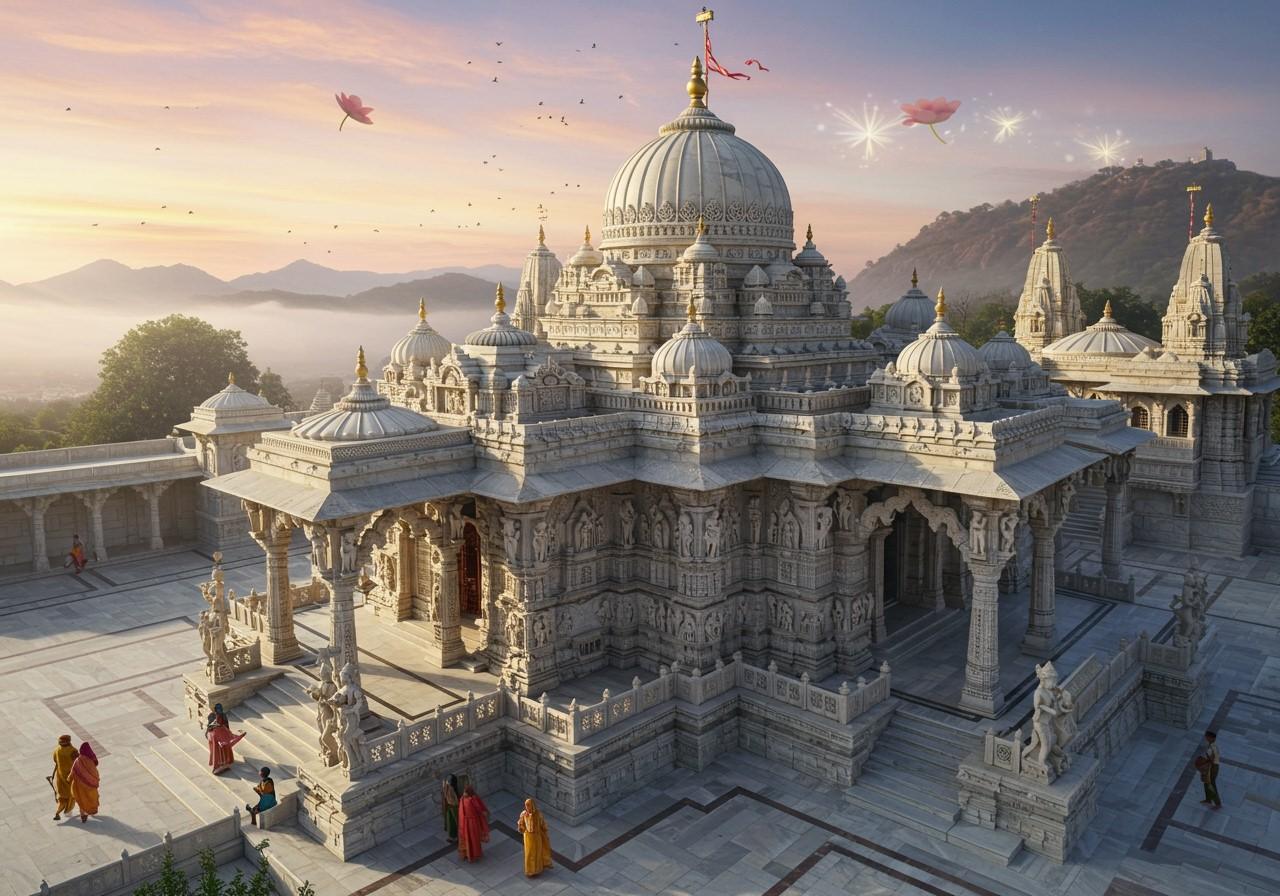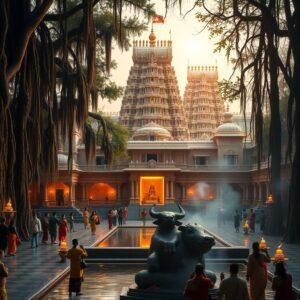
The Dilwara Temples, also known as Delvada Temples, stand as a remarkable testament to Jain architectural brilliance in the serene hills near Mount Abu, Rajasthan. These temples, renowned for their intricate craftsmanship and exquisite use of pure white marble, attract tourists and devotees alike. This article delves into the stunning architecture, rich history, and unique design of these temples, emphasizing their significance in India’s cultural and religious landscape.
A Journey Through Time: The History of the Dilwara Temples
The Dilwara Temples were constructed between the 11th and 13th centuries A.D. under the patronage of the Solanki dynasty, later with contributions from the Vaghela dynasty. Vimal Shah, minister to Solanki king Bhima I, began the earliest construction. Vastupala, a Jain minister of the Vaghelas, further enhanced the temples. This era witnessed a flourishing of religious art and architecture, and the Dilwara Temples exemplify this period’s artistic achievements. The influence of Jain philosophy is clearly visible in the temples’ design, seamlessly blending simplicity and artistic brilliance.
Architectural Marvels: A Symphony in Marble
Crafted from pristine white marble sourced from the Arasoori Hill quarries, the Dilwara Temples are a breathtaking display of intricate carvings. Each of the five main temples—Vimal Vasahi, Luna Vasahi, Pithalhar, Parshvanath, and Mahavir Swami—possesses unique characteristics and is dedicated to different Jain Tirthankaras. The Luna Vasahi Temple, dedicated to Shri NemiNathJi, the 22nd Tirthankara, was built in 1230 A.D. by Vastupala. The temples showcase a harmonious blend of Nagara and Dravidian architectural styles, evident in the detailed carvings adorning the pillars, ceilings, and doorways.
The Rang Mandap, the central hall for religious ceremonies, is a masterpiece of carved pillars, each a testament to the artisans’ skill. The Navchowki, a cluster of nine intricately carved ceilings, is a highlight of the Dilwara Temples. These ceilings often depict lotus buds, petals, and geometric patterns, reflecting the Jain principles of symmetry and proportion.
Spiritual Significance: A Pilgrimage Destination
The Dilwara Temples are not merely architectural wonders; they hold immense spiritual significance for the Jain community. These temples serve as a major pilgrimage site, attracting devotees worldwide. They are vibrant centers for celebrating Jain festivals and rituals, enriching the region’s cultural tapestry and preserving ancient traditions. The temple complex also houses a collection of ancient Jain texts and manuscripts, safeguarding Jain knowledge and philosophical insights. The temples actively promote core Jain principles like non-violence (ahimsa) and compassion (karuna).
Preservation: Safeguarding a Legacy
Preserving the Dilwara Temples is paramount due to their historical and architectural value. The delicate marble structures are susceptible to environmental factors, necessitating ongoing conservation efforts. The Archaeological Survey of India plays a crucial role in maintaining the structural integrity and aesthetic beauty of the temples. Local communities and religious organizations actively participate in preservation activities, ensuring these temples inspire future generations. A balance between promoting tourism and maintaining the sanctity of these sacred sites is crucial for their long-term preservation.
Poojn.in: Enhancing Your Spiritual Journey
Poojn.in offers a curated selection of items to enhance your spiritual experience when visiting temples like the Dilwara Temples. Our products are chosen to help maintain the sanctity of temple traditions:
- Pure Cotton Vastras: We offer traditional white cotton vastras appropriate for temple visits, adhering to the dress code of sacred spaces like Dilwara. These garments are crafted with respect for tradition and provide comfort during prayer and meditation. Browse our collection.
- Puja Thalis: Our brass and silver puja thalis are ideal for offerings and prayers, similar to those used in temple rituals. These thalis are crafted with intricate designs and are available in various sizes to suit your needs. Find the perfect thali for your practice.
- Incense and Dhoop: We offer premium incense sticks and dhoop to create a serene atmosphere reminiscent of Jain temples. Our selection includes traditional fragrances that enhance meditation and prayer. Explore our range of incense and dhoop.
- Prayer Beads (Malas): Discover authentic rudraksha and sandalwood malas for your meditation and prayer practices. These malas are crafted with high-quality materials and are designed for comfortable use during extended prayer sessions. Choose your mala today.
These products are available for home delivery across India through our website www.poojn.in. Each item undergoes rigorous quality checks to ensure authenticity and adherence to traditional standards. Our customer service team is available to provide guidance on product selection and usage for temple visits.
A Timeless Legacy: The Enduring Beauty of Dilwara
The Dilwara Temples are more than just architectural marvels; they are a testament to Jain heritage, artistry, and spirituality. Their exquisite carvings and tranquil surroundings offer a space for reflection and reverence for both devotees and art enthusiasts. Each temple narrates a unique story of devotion and artistic skill. As you explore these sacred halls, you are enveloped by the whispers of history and the echoes of devotion. Preservation efforts ensure these temples continue to inspire awe and reverence, representing a harmonious blend of culture, history, and spirituality. The Dilwara Temples stand as a timeless legacy, reminding us of the enduring power of faith and art.


